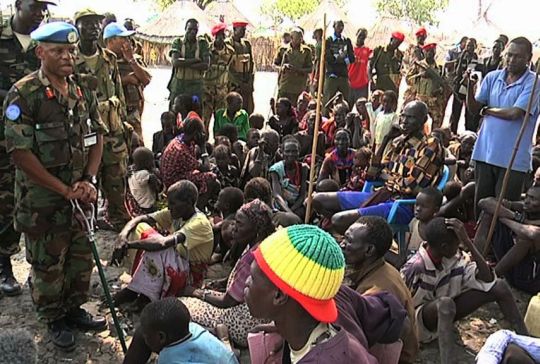Cycle of ethnic violence in South Sudanese state must end, UN envoy says
Cycle of ethnic violence in South Sudanese state must end, UN envoy says

The “cycle of violence” between ethnic communities in Jonglei state in South Sudan must end, the top United Nations official in the newly independent country has warned, calling on the Government, church leaders, civil society groups and the communities themselves to each play their part to achieve peace in the troubled area.
Hilde F. Johnson, the Special Representative of the Secretary-General and the head of the UN Mission in South Sudan (UNMISS), yesterday travelled to the town of Pibor and the village of Fartait in Jonglei, both the scene of recent attacks by a large group of armed youths from the Lou Nuer community, which has engaged in deadly clashes over the past year with the Murle community in Jonglei.
The people of Jonglei state from all sides have suffered enough.
Accompanied by General Moses Obi, the Force Commander of UNMISS, and diplomatic representatives of the United States, France and the United Kingdom, Ms. Johnson visited a temporary clinic set up by UN peacekeepers to treat wounded civilians and met with residents and internally displaced persons (IDPs) who have returned home to Pibor and Fartait after the attacks.
UN agencies, backed by UNMISS, have launched a major aid operation in Jonglei – a remote area in the east of the country – to help the estimated 60,000 civilians in urgent need of humanitarian assistance. The distribution of food rations has begun in Pibor and will continue in the town and in other areas.
“We have to see this cycle of violence stop,” she said. “The people of Jonglei state from all sides have suffered enough. The safety and security of all must now come first. This means a committed, coordinated and cooperative drive by all concerned to achieve peace and stability.”
Ms. Johnson welcomed the South Sudanese Government”s decision to deploy extra security forces to the area, despite the logistical challenges in doing so, and called for even more forces to be deployed to the buffer zones between the two ethnic communities.
The Special Representative also urged the Government to move swiftly to set up its peace team to deal with the problems in Jonglei and their root causes, working with church leaders, civil society groups and the communities.
“Only in this way can further violence be averted and new humanitarian crises be prevented,” she said.
A human rights team has been dispatched by UNMISS to the area to investigate rights violations and to verify media reports about casualty numbers. But she noted that the Pibor county commissioner Joshua Kenyi had said that previously reported casualty figures were unverified.
“This concurs with our preliminary assessment on Friday and available baseline information of the affected area. Neither this information nor the findings of my visit of today, show any evidence that can support the figures that were reported by some media.”
The South Sudanese Government is also investigating the events in Jonglei to establish accountability, and Ms. Johnson called that a “very positive” step.
South Sudan has faced renewed bouts of inter-ethnic violence since it became independent in July last year after voters backed secession from Sudan in an earlier referendum.
UNMISS has reinforced its presence in key areas of Jonglei to protect civilians following the recent violence and is continuing to conduct daily air and land patrols. But the mission has repeatedly stressed that the Government has the main responsibility of restoring peace and stability.
###
> United Nations (UN).
 The United Nations was established on 24 October 1945 by 51 countries committed to preserving peace through international cooperation and collective security. Today, nearly every nation in the world belongs to the UN: membership totals 192 countries.
The United Nations was established on 24 October 1945 by 51 countries committed to preserving peace through international cooperation and collective security. Today, nearly every nation in the world belongs to the UN: membership totals 192 countries.
When States become Members of the United Nations, they agree to accept the obligations of the UN Charter, an international treaty that sets out basic principles of international relations. According to the Charter, the UN has four purposes:
- to maintain international peace and security;
- to develop friendly relations among nations;
- to cooperate in solving international problems and in promoting respect for human rights;
- and to be a centre for harmonizing the actions of nations.
###
* The above story is adapted from materials provided by United Nations (UN)
** More information at United Nations (UN)



















